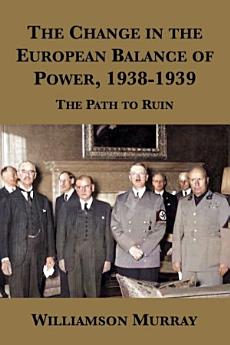The Change in the European Balance of Power, 1938-1939: The Path to Ruin by Williamson Murray
About this ebook
“Murray... [has] mastered an impressive range of archival and published sources... advances a robust, revisionist thesis. By a careful correlation of the economics of German rearmament with Hitler's foreign policy and strategy between 1933 and 1939, he makes a strong case that right up to the outbreak of war Germany was much less thoroughly prepared for a major war than most of her contemporary opponents imagined, or than most historians have realized since... Hitler began a wholesale effort at rearmament from the moment he became Chancellor. Although this rearmament programme was immense, when compared to other European states, it was severely handicapped by Germany's heavy dependence on imported raw materials, insufficient foreign credit and shortage of skilled labour... The occupation of the Sudetenland brought few economic advantages, but the seizure of the remainder of Czechoslovakia in March 1939 yielded an enormous benefit in raw materials, industrial resources, and immediately available guns, ammunition, and tanks... [a] scholarly and powerfully argued study... in particular all future students of the subject will have to grapple with Professor Murray's analysis of Germany's economic problems and military deficiencies.” — The English Historical Review
“Williamson Murray's [book... applies] a reality test to the policies of the great powers in the late 1930s. The test rests on a simple assumption, as irrefutable as it is commonly ignored: military power is the hard, cold cash of international life... Hitler, as Murray puts it, ‘more often than not made correct strategic decisions.’ Chamberlain and associates ‘made the wrong choice on almost every strategic and diplomatic question that they faced.’ Catastrophe in 1940 was the result... a work that is rich in archival knowledge, sophisticated argument, the occasional subtle dig, and an uncommon sense of the difficulties and ambiguities that face those who must decide. Murray's cogent presentation of the evidence and his uncompromising, uncomforting conclusions are a devastating blow to the ‘revisionist school’ on appeasement... an essential book for anyone who studies the interwar period or is seriously interested in either the interrelationship of policy and strategy or the nature of relations between states.” — The Journal of Modern History
“Murray offers a masterful survey of the essentials which are background to decision-making in Germany, England and France which produced both the war and the catastrophe for the West in the war's first year... This monograph is well researched, fully documented, and well written... Political leaders, diplomats and military planners should have this book on their ‘must read’ list... [an] important work.” — The Historian
“[A]n excellent piece of historical research... a comprehensive, well-written, and well-organized narrative of the key issues affecting the foreign policymaking process... it is to be recommended as a thorough introduction to the topic and an admirable attempt at historical synthesis.” — The International History Review
About the author
Williamson “Wick” Murray (1941-2023) attended the Berkshire School in Sheffield, Massachusetts and graduated from Yale University in 1963 with honors in history before serving as an officer in the US Air Force for 5 years, including in Southeast Asia with the 314th Tactical Airlift Wing operating C-130s. He returned to Yale’s Department of History where he earned his PhD in military-diplomatic history in 1974 and taught there for two years. His doctoral dissertation resulted in his first book, The Change in the European Balance of Power, 1938-1939.
In 1977 Murray moved to Ohio State University where he taught military and diplomatic history, retiring in 1995; in 2012 he was made professor emeritus of history. He also taught at several universities and military academies, including the US Air War College, the US Military Academy, and the Naval War College. He was Centennial Visiting professor at the London School of Economics, Matthew C. Horner Professor of Military Theory at the Marine Corps University, Charles Lindbergh Chair at the Smithsonian’s Air and Space Museum, and Harold K. Johnson Professor of Military History at the Army War College.
Murray authored numerous books and articles on military history and strategic studies, and edited other projects. In 2019 the Society for Military History awarded Murray the Samuel Eliot Morison Prize for lifetime achievement in the field of military history.








